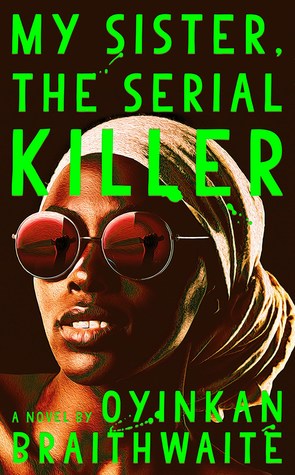Ayoola summons me with these words – Korede, I killed him. I had hoped I would never hear those words again.
The above is the opening of My Sister, the Serial Killer; the entirety of the first chapter that serves well to exemplify the book's punchy structure and darkly ironic tone. Set in Lagos, Nigeria, we soon learn that the main character, Korede, is the responsible, hard-working and plain-looking older sister to Ayoola – a beautiful, flighty, social media maven and man magnet – and although Korede might be weary of always looking after her younger sibling, she'll always clean up her messes – even if that involves mopping up blood and dumping bodies. However, when Ayoola sets her sights on the handsome doctor that Korede has been secretly admiring from her nurse's desk, Korede will need to decide which one of them her heart most wants to protect. This is a very short read (just a few hours) and I enjoyed the tone and the plot and the briefest glimpse into Nigerian culture. There's just a kernel of social commentary that I wish author Oyinkan Braithwaite had given herself more room to explore, but even this kernel saved the whole from being pointless fluff for me. I'd rate this 3.5 and it feels like a generous rounding up to go to 4 stars.
Femi makes three, you know. Three, and they label you a serial killer.This isn't a grisly book – we see Korede clean up after the murder alluded to in that first chapter, and that's about it – and most of the plot involves the present day love triangle and Korede recalling earlier incidents from the sisters' lives. It must be hard to take a back seat to one's more beautiful and spoiled younger sister (“Ayoola resembles a Bratz doll and I look like a voodoo figurine”), and especially since their mother has always preferred the younger (“Ayoola would take an apple and leave the store without paying for it, and I would be blamed for letting her get hungry “), but Korede's tone is uncomplaining and fairly nonjudgemental, which adds a hint of black comedy:
Ayoola walks in, and every head turns her way and stays there. I stop where I am, rattle in hand, trying to understand what is happening. She looks as though she has brought the sunshine in with her. She is wearing a bright yellow shirtdress that by no means hides her generous breasts. Her feet are in green, strappy heels that make up for what she lacks in height, and she is holding a white clutch, big enough to house a nine-inch weapon.As I said, the kernel of social commentary is what I most liked about this read. I understand that Nigeria is a huge, multicultural society – many cultures were uncomfortably mashed together by the borders imposed by colonial powers and that has had lasting political consequences – but by briefly sketching the various men that the sisters have had dealings with, it would seem that entrenched misogyny is a connecting ethos. Rich urbanites cheat on their wives without consequence, a tribal chief can claim a young girl as his own if he touches her with his cane, a Muslim man can sever his relationship with his wife by saying “I divorce you” three times, a young woman has no recourse if a policeman demands a bribe (and on and on). In a society where women lack power, isn't there something a little bit karmically satisfying about a young beauty (underestimated and patronised by the lovesick men who think they know what's good for her) who pushes back?
There's something wrong with her...but you? What's your excuse?By the end of My Sister, the Serial Killer, Braithwaite unveils the forces that may have turned Ayoola into a sociopath, but the question still lingers: in the real world, would Korede really be disposing of the bodies out of sisterly duty? I don't know if the plot passes a reality sniff test (and a couple of plotpoints were unfortunately clunky tropes), but I did find this read (in tone and commentary) to be worthwhile. I'd love to read something longer and deeper by Braithwaite.
Man Booker Longlist 2019:
- Margaret Atwood, The Testaments
- Kevin Barry, Night Boat to Tangier
- Oyinkan Braithwaite, My Sister, The Serial Killer
- Lucy Ellmann, Ducks, Newburyport
- Bernardine Evaristo, Girl, Woman, Other
- John Lanchester , The Wall
- Deborah Levy, The Man Who Saw Everything
- Valeria Luisell, Lost Children Archive
- Chigozie Obioma, An Orchestra of Minorities
- Max Porter, Lanny
- Salman Rushdie, Quichotte
- Elif Shafak, 10 Minutes 38 Seconds in This Strange World
- Jeanette Winterson, Frankissstein
Eventually won by The Testaments and Girl, Woman, Other in a tie, my favourites on the list were Lanny, Night Boat to Tangier, and An Orchestra of Minorities. I fear the Man Booker has become too political for me - favouring identity politics over excellent storytelling - and I don't know how much longer I'll think it a badge of honour to keep reading the longlists.

